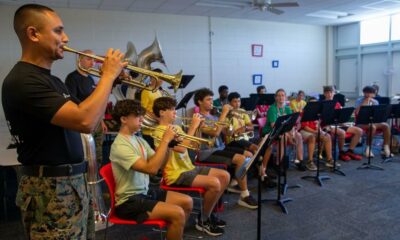Mississippi Today
Pearl police officer fired for allegedly stealing $32K from dying woman

The Pearl Police Department fired patrol officer Taylor Loftin for reportedly stealing $32,000 from a dying woman’s house. It’s the second officer dismissed for alleged criminal conduct in less than a year.
On the morning of Nov. 18, Jason Kelly’s mother, Jackie, collapsed unexpectedly, and his father called 911.

Ambulance workers arrived. So did four or five Pearl police officers, including Loftin, Kelly said.
His 80-year-old mother never recovered and may have died of a blood clot, he said. “It was unexpected.”
She had just inherited $32,000 and received the money in cash, which she put in an envelope in her drawer in the bedroom, he said.
After ambulance workers and police left, Kelly said his father determined the cash had been stolen and called Pearl police, who returned to the home.
After arriving, Loftin admitted that he had opened the drawer and seen the money, but he insisted he closed it right back, Kelly said. “He turned off his camera and stole $32,000.”
Kelly praised Pearl police’s swift response and said, “I hope they press charges.”
He said he doesn’t know if the city is going to pay the family back.
The Mississippi Bureau of Investigation is investigating, but spokesperson Bailey Martin said the agency could not comment further. Loftin could not be reached for comment.
Kelly believes there must have been thefts on previous occasions as well. “This ain’t his first time doing this,” he said.
Pearl Police Chief Nick McLendon said he’s not aware of any previous incidents.
Asked about possible criminal prosecution, he said he could not comment further because the case is under investigation.
He said in a statement made public that the officer hasn’t been charged with any crime and should be presumed innocent. But the department, he said, “must be concerned with even the slightest appearance of impropriety — and especially in the area of law enforcement.”
Two days before Christmas 2023, Pearl police officer Michael Christian Green forced a man he arrested to lick urine from a holding cell floor.
The 26-year-old officer took the man into custody after a family disturbance call to Sam’s Club in Pearl. After he booked the man into a holding cell, footage showed the man telling Green he needed to urinate, but when Green failed to respond, the man urinated in a corner, according to the federal bill of information.
When Green found out what the man had done, Green berated him, “Let me tell you something. You see this phone? I will beat your f—ing ass with it. You’re fixin’ to go in there, and you’re gonna lick that p— up. Do you understand me? … Go suck it up right now.”
Green filmed the man as he licked the urine from the floor, and when the man gagged, Green said, “Don’t spit it out.” When the man gagged, Green responded, “Lick that s— up. Drink your f—in’ p—.”
When the man was allowed to leave the booking area, he vomited in a garbage can.
On June 13, Green was sentenced to a year in federal prison and a $1,500 fine. He told the judge he regrets what he did.

At a press conference after Green’s guilty plea, Pearl Mayor Jake Windham told reporters, “God created us in his image. Treating someone like this is despicable.”
“If you’re going to operate as a police officer,” said Windham, who served in law enforcement for 16 years, “you’ve got to do things right.”
He apologized to the man and his family for “the horrible treatment by an officer of the law.”
At the time, Windham declared, “We hold our officers to a higher standard.”
Four days after the incident, Windham confronted Green and told him to resign, which he did.
The city handles matters swiftly, Windham said. “I think there’s a stark contrast between the Pearl Police Department and this incident [and the handling of] the ‘Goon Squad.’”
Six Rankin County officers were involved in the January 2023 torture of two Black men and the shooting of one of them, but it wasn’t until six months later that those involved were fired. The six officers pleaded guilty and are now serving between 10 and 40 years in federal prison.
Green had been on the force six months when this incident occurred. “His certificate was clean when he came to the Pearl Police Department,” Windham said. “We strive to do an extensive background check on people.”
He said he hopes law enforcement agencies would report any problems with officers to the Mississippi Board on Law Enforcement Officer Standards and Training.
A new law, passed in the wake of the Goon Squad’s acts, beefs up the board’s ability to investigate allegations against officers.
As for Loftin, McLendon put the officer on administrative leave after investigating the matter. On Thursday, the Pearl Board of Aldermen fired the officer on McLendon’s recommendation.
“We acted on it immediately,” Windham said. “We don’t put up with it.”
It’s a bad situation when “you have to terminate officers,” he said, “but we’re going to make sure that if they screw up, we’re going to send them down the road.”
Asked about getting the $32,000 back to the family, the mayor replied, “Our goal is to make the family whole as soon as possible.”
Loftin was hired by Dean Scott, who resigned as Pearl police chief in January after an investigation into possible misuse of tax dollars. A WLBT investigation revealed that Scott claimed to work for Rankin County as a homestead fraud investigator while on city business at law enforcement conferences on the Coast. He now works as a lieutenant for Capitol Police.
Loftin worked at a series of jobs in law enforcement. He worked at Flowood Police Department and Brandon Police Department before starting at Pearl Police Department, where he had worked a few years.
Loftin graduated from Baylor University, is married and has a newborn son, according to his Facebook page.
“He threw his whole life away,” Kelly said. “You risk your whole family for $32,000?”
This article first appeared on Mississippi Today and is republished here under a Creative Commons license.![]()
Mississippi Today
‘Easy to just write us off’: Rural students’ options shrink as colleges slash majors

This story was co-published with Open Campus, The Hechinger Report, and The Washington Post
CLEVELAND, Miss. — With no car and a toddler, Shamya Jones enrolled this fall at the four-year university in her small town in Mississippi — Delta State University.
She planned to major in digital media arts, but before she could start, the college eliminated that major, along with 20 other degree programs including history, English, chemistry and music.
“They’re cutting off so much, and teachers [are] leaving,” Jones said. The cuts “take away from us, our education.”
Across the country, rural students like Jones are feeling short-changed and frustrated.
Many of the comparatively few universities that serve rural students are eliminating large numbers of programs and majors, blaming plummeting enrollment and resulting financial crises. Nationwide, college enrollment has declined by 2 million students, or 10 percent, in the 10 years ending in 2022, hitting rural schools particularly hard. An increasing number of rural private, nonprofit colleges are not only cutting majors, but closing altogether.
“We are asking rural folks to accept a set of options that folks in cities and suburbs would never accept,” said Andrew Koricich, a professor of higher education at Appalachian State University in Boone, North Carolina. “It’s almost like, ‘Well, this is what you get to learn, and this is how you get to learn it. And if you don’t like it, you can move.’ ”
For many rural students, there are already few places to go. About 13 million people live in higher education “deserts,” the American Council on Education estimates, mostly in the Midwest and Great Plains, where the nearest university is beyond a reasonable commute away.
Meanwhile, more than a dozen private, nonprofit universities and colleges that are in rural areas or serve large proportions of rural students have closed since 2020, data show.
“It is creating a second class of people to say, ‘You pay your taxes just like everybody else does. You vote like everybody else does. But you just can’t have the same choices as everybody else, because there aren’t enough of you here,’” Koricich said of the cuts. “In a lot of rural places, the idea of choice is sort of a fiction,” he said.
Rural-serving institutions are defined by the Alliance for Research on Regional Colleges, or ARRC, which Koricich directs, as those located in counties classified as rural and not near a metropolitan area.
Even some flagship universities that serve rural communities are making big cuts. West Virginia University this fall began the process of eliminating 28 undergraduate and graduate majors and programs, including most foreign languages and graduate programs in math and public administration. The University of Montana is phasing out or has frozen more than 30 certificate, undergraduate and graduate degree programs and concentrations. A course review is also underway at branch campuses of Pennsylvania State University due to declining enrollment.
But most of the cuts have occurred at regional public universities, which get considerably less money from their states — about $1,100 less, per student, than flagships, the ARRC calculates. Regional institutions educate 70 percent of undergraduates who go to public four-year schools, according to the American Association of State Colleges and Universities. These campuses are also more likely than other kinds of institutions to enroll students from lower-income families and who are the first in their families to go to college, the Baltimore-based Art & Science Group consulting firm found.
St. Cloud State University in Minnesota is cutting 42 degree programs, for example, including criminal justice, gerontology, history, electrical and environmental engineering, economics and physics. The University of Alaska System has scaled back more than 40 programs since 2020, including earth sciences, geography and environmental resources and hospitality administration. Also during that period, Henderson State University in Arkansas dropped 25 and. Emporia State University in Kansas cut, merged or downgraded around 40 undergraduate and graduate majors, minors and concentrations.
The State University of New York at Fredonia is dropping 13 majors. SUNY Potsdam is cutting chemistry, physics, philosophy, French, Spanish and four other programs. The University of North Carolina Asheville is discontinuing religious studies, drama, philosophy and concentrations in French and German.
Related: In this shrinking Mississippi Delta county, getting a college degree means leaving home behind
“Some institutions have no other options” than to do this, because of financial problems and plummeting enrollment, said Charles Welch, president and CEO of the American Association of State Colleges and Universities and a former president of Henderson State and the Arkansas State University System, both of which have cut programs.
At Delta State, for instance, enrollment is down by nearly a quarter since 2014.
A drop in tuition revenue stemming from that decline created an $11 million hole in the university’s budget, President Daniel Ennis told the campus last year. When Ennis got to Delta State, he also found the university was overestimating its revenue from facilities and merchandise.

“At a certain point there’s going to be less of everything — personnel, money, equipment and opportunities — because we have to rightsize the budget,” Ennis said.
But the American Association of University Professors, which represents faculty, said in a 2021 report that problems such as enrollment drops made worse by the pandemic are being exploited by administrators to close programs “as expeditiously as if colleges and universities were businesses whose CEOs suddenly decided to stop making widgets or shut down the steelworks.”
Welch said schools are often simply trying to reduce program duplication among campuses in the same systems and compensate for having less financial support than flagship universities.
“The challenge that our institutions have is that they tend to be lower resourced than institutions in urban areas, or flagship institutions. They can’t rely on big endowments,” Welch said. The pandemic, he said, “threw a whole additional layer on top of what those institutions were already facing.”
Many of the majors affected are in the humanities and languages, making those disciplines less available to rural students than they are to people who live in urban and suburban areas.
These subjects “do much of the work of helping students dream beyond their realities,” said Michael Theune, who chairs the English Department at Illinois Wesleyan University, a private, nonprofit school that has also eliminated majors. “We are paring down the sense of the vastness of our world and the possibilities of university students to experience it differently.”
Some rural-serving public universities and public universities in largely rural states have now undergone repeated rounds of cuts. Youngstown State University in Ohio, for instance, axed Italian, religious studies and other majors in 2021, then six more this year. In all, more than 25 programs have now been eliminated there, many of them in the humanities.
The university, in a message to the campus, pointed out that there were no students at all in 10 of those majors. But students and faculty say it was still important to offer them.

“It is easy to just write us off as, ‘Oh, well, do they really need that school?’ when there are so many other majors,” said Owen Bertram, a senior theater major whose program has so far escaped the cuts. “But I don’t think it’s that simple.”
Bertram, who is also student government representative for the university’s College of Creative Arts, said it’s hard to watch his classmates who wanted to study humanities struggle with the questions, “Do I stay?” “Do I leave?” “Is it worth it?”
At many of the schools, it’s too early to tell if the program cuts will lead to even lower enrollment. In some cases, however, enrollment has continued to decline. At Emporia State, enrollment is down by 14 percent in the two years since about 40 majors were eliminated there.
These cuts come at a time when the proportion of rural high school graduates going to college is falling. Fifty-five percent enroll right after high school, down from 61 percent in 2016, according to the National Student Clearinghouse Research Center. That’s a lower rate than the national average.
Low-income and Black students are disproportionately impacted by program cuts. The University of North Carolina Greensboro, for example, is in the process of phasing out 20 degree programs, including anthropology and physics. More than half the students are low income and 28 percent are Black, according to the state university system.

“UNCG should be a place where anyone should be able to come and get an affordable education in whatever they want,” said Holly Buroughs, a physics major who started a petition protesting the cuts.
“Is a first-gen student like me going to come next year and not see the UNCG that I fell in love with and the opportunities I had?” asked Azariah Journey, a second-year graduate student in history who comes from a rural town in Kentucky.

Related: A community college promises a rural county it ‘hasn’t been left to die’
Dominick Bellipanni is one of the last remaining music students at Delta State as the department is being phased out. He received a scholarship to study piano, which he isn’t sure he would have gotten at the state’s larger, more competitive universities.
Bellipanni is from Indianola, a once-busy crossroad 30 minutes from the university, where he grew up hearing stories about businesses that once operated there but closed.

“Used to be, used to be, used to be,” he remembered people telling him.
Now he’s hearing that again.
His professors talk about how there used to be more music recitals, more scholarships, more money, said Bellipanni, who said he plans to leave the Mississippi Delta when he graduates.
“All you hear is, ‘We used to have this, because we used to have more students.’ ”
Contact writer Jon Marcus at 212-678-7556 or jmarcus@hechingerreport.org.
This story about rural college majors was produced by The Hechinger Report, a nonprofit, independent news organization focused on inequality and innovation in education, and Open Campus, a nonprofit newsroom focused on strengthening local coverage of higher education. Reporters in the Open Campus Local Network contributed: Mississippi Today’s Molly Minta, WUNC’s Brianna Atkinson and Signal Ohio’s Amy Morona
This article first appeared on Mississippi Today and is republished here under a Creative Commons license.![]()
Mississippi Today
On this day in 1883


Nov. 26, 1883

Abolitionist and women’s rights advocate Sojourner Truth (whose original name was Isabella Baumfree) died in Battle Creek, Michigan.
Freed from slavery, she wandered the country, calling for an end to the institution. “Ain’t I a woman?” she told a women’s rights convention in Akron, Ohio. “I have borne 13 children and seen most all sold off to slavery and when I cried out with my mother’s grief, none but Jesus heard me. And ain’t I a woman?”
A century after her death, she was elected to the Women’s Hall of Fame. A statue of her can be found in Battle Creek, less than a mile from the nation’s largest monument to the Underground Railroad.
This article first appeared on Mississippi Today and is republished here under a Creative Commons license.![]()
Mississippi Today
Vote today: Voters head to polls for judicial runoffs. What you need to know

Polls will be open from 7 a.m. to 7 p.m. today as voters in central Mississippi choose a state Supreme Court justice and those in south Mississippi choose a Court of Appeals judge.
In the Jackson Metro area and parts of central Mississippi, incumbent Supreme Court Justice Jim Kitchens will compete against Republican state Sen. Jenifer Branning of Neshoba County. In areas on the Gulf Coast, Jennifer Schloegel and Amy St. Pé will face each other for an open seat on the Court of Appeals.
READ MORE: Meet the 2 Candidates for Mississippi Supreme Court’s Nov. 26 Runoff Election
READ MORE: Amy St. Pé, Jennifer Schloegel advance to runoff for Court of Appeals race
Voters are reminded to bring a photo identification. This can include a valid Mississippi driver’s license, an identification or employee identification card issued by any government entity of the U.S. or state of Mississippi, a U.S. passport, a military photo ID card, a current student ID card issued by an accredited college or university or a Mississippi voter ID card. For more information on voter ID rules, check here.
Those who do not have a valid ID can vote affidavit, but must return and present a photo ID within five days for their ballot to count. Voters waiting in line as polls close at 7 p.m. will still be allowed to vote. If you vote absentee or affidavit, you can track the status of your ballot here.
POLLING PLACE LOCATOR: Use the secretary of state’s online locator to find where you vote
Stay tuned to Mississippi Today for live results, starting after polls close.
The Mississippi secretary of state’s office offers an online resource, My Election Day, where voters can locate or confirm their polling place, view sample ballots and view current office holders. Those with doubts or questions about their precinct locations are urged to contact their local election officials. Contact info for local election officials is also provided on the My Election Day site.
The secretary of state’s elections division can be contacted at 1-800-829-6786 or ElectionsAnswers@sos.ms.gov.
The U.S. attorney’s office investigates election fraud, intimidation or voting rights issues and can be contacted at 601-973-2826 or 601-973-2855, or complaints can be filed directly with the Department of Justice Civil Rights division at civilrights.justice.gov. Local law enforcement holds primary jurisdiction and serves as a first responder for alleged crimes or emergencies at voting precincts.
The secretary of state’s office also provides some Election Day law reminders:
- It is unlawful to campaign for any candidate within 150 feet from any entrance to a polling place, unless on private property.
- The polling places should be clear of people for 30 feet from every entrance except for election officials, voters waiting to vote or authorized poll watchers.
- Voters are prohibited from taking photos of their marked ballots.
This article first appeared on Mississippi Today and is republished here under a Creative Commons license.![]()
-

 Local News7 days ago
Local News7 days agoSherral’s Diner to be featured on America’s Best Restaurants
-

 Local News4 days ago
Local News4 days agoIntroducing our Student Athlete of the Week: Ocean Springs’ very own Mackenzie Smith
-

 News from the South - Georgia News Feed6 days ago
News from the South - Georgia News Feed6 days agoJose Ibarra found guilty in murder of Laken Riley | FOX 5 News
-

 News from the South - Alabama News Feed7 days ago
News from the South - Alabama News Feed7 days agoTrial underway for Sheila Agee, the mother accused in deadly Home Depot shooting
-

 News from the South - Kentucky News Feed6 days ago
News from the South - Kentucky News Feed6 days agoNicholasville organization activates weather plan in response to bitter cold temperatures
-

 News from the South - Alabama News Feed6 days ago
News from the South - Alabama News Feed6 days agoJudge grants mistrial in Sheila Agee trial due to ‘unhinged juror’
-

 News from the South - Alabama News Feed7 days ago
News from the South - Alabama News Feed7 days agoAlabama's weather forecast is getting colder, and a widespread frost and freeze is likely by the …
-

 News from the South - Louisiana News Feed7 days ago
News from the South - Louisiana News Feed7 days agoLawmakers discuss how music industry can improve Louisiana’s economy | Louisiana




























